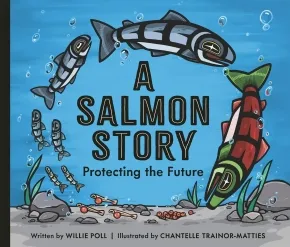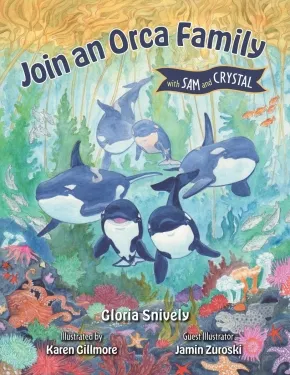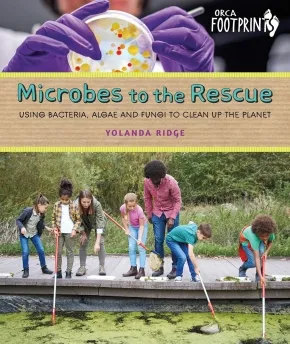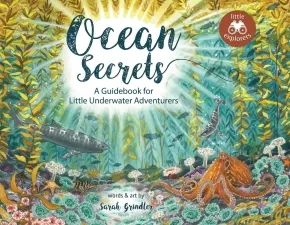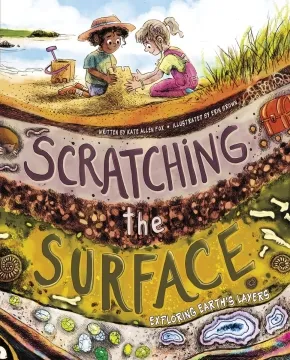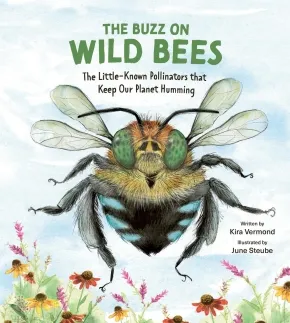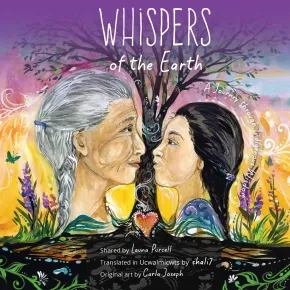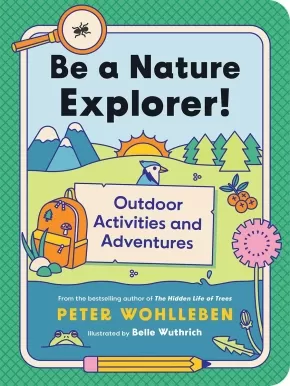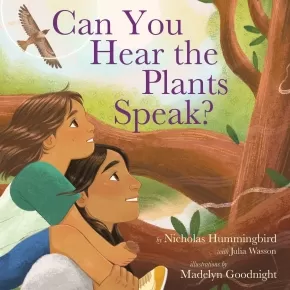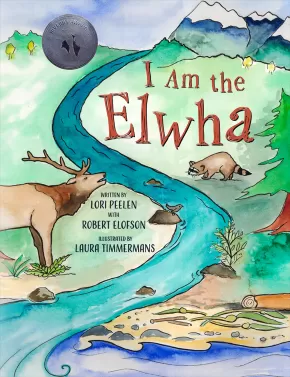
Environment
1
-
15
of
175 Results;
Sort By
Go To
of 12
The Cedar Mother
$24.95
Artists:
Format:
Hardcover
Text Content Territories:
Indigenous Canadian; First Nations; Gitxsan (Gitksan);
ISBN / Barcode: 9781774921586
Synopsis:
Synopsis:
From small sapling to towering giant, follow the long life of a cedar tree in this illustrated book for young scientists.
Step outside to explore the hidden mysteries of the cedar tree life cycle in this beautifully illustrated, engaging non-fiction book for young scientists ages 9 to 12.
Meet Nox Sim Gan, the cedar mother, whose life cycle spans centuries and whose roots anchor the landscape. The cedar mother plays a vital role in the ecosystem: offering shelter for birds in her strong limbs, providing refuge for small creatures beneath her bark, and healing the Gitxsan with a medicinal tea made from her soft, green leaves. She also creates the very oxygen that all land-dwelling creatures need to breathe.
Delve into the remarkable story of the western red cedar as you learn how she nourishes herself through an unexpected connection to salmon, the secret web of life that thrives beneath the ground, and how, at the end of her life, she leaves a final gift for the Gitxsan. This book invites young readers to discover the life of a tree that is much more than meets the eye, offering lessons in interconnectedness, and in wisdom passed down through generations.
Educator & Series Information
Recommended for ages 9 to 12.
Lexile measure: 1050L
This book is part of the Mother of Xsan series, which uses striking illustration and lyrical language to bring the poetry of the Xsan ecosystem to life. It is the eighth book in the series.
Additional Information
32 pages | 6.50" x 10.00" | Hardcover
A Kid's Guide to Plants of the Great Lakes Region: Including Southern Ontario with Cool Facts, Activities and Recipes
$26.95
Format:
Paperback
Text Content Territories:
Indigenous Canadian;
ISBN / Barcode: 9781998526109
Synopsis:
Synopsis:
A middle-grade-friendly introduction to flora of the Great Lakes Region, with outdoor activities, games and quizzes that make learning about nature fun! Great for families and educators.
Get dirty digging up roots. Crouch down to look closely at a carnivorous sundew dissolving a dragonfly. Make an elderberry concoction. Test your plant ID skills with a winter twig quiz. Make a soothing plantain salve to treat an itch. Learn which berries you can eat and which to avoid.
Time spent outdoors encourages children’s self-confidence and independence, increases attention span and physical well-being, and fosters care for the environment. With the increasing intrusion of technology into daily life, and the challenges of climate chaos, it has never been more essential for parents and educators to encourage kids to engage with the natural environment. Plants are everywhere, even in urban areas where parks, empty lots and backyards offer the opportunity to learn from and connect to nature.
Drawing on their years of experience as outdoor educators, co-authors Philippa Joly and Danielle Gehl Hagel feature fifty richly illustrated plant profiles, including information on identification and ecology, cultural uses, and fun activities—all in a way that is accessible and interesting to readers of all ages.
Educator Information
Juvenile Nonfiction.
Additional Information
224 pages | 8.50" x 8.50" | Paperback
A Salmon Story: Protecting the Future
$22.95
Artists:
Format:
Hardcover
Text Content Territories:
Indigenous Canadian; First Nations; Salish; Interior Salish; St'at'imc (Lillooet, Lil'Wat);
ISBN / Barcode: 9781771476461
Synopsis:
Synopsis:
A lyrical informational picture book about how open-net pen fish farms impact wild salmon and their ecosystems
Salmon are central to their ecosystem and the lives of many Indigenous Nations, but the rapid rise of open net-pen fish farming has threatened these longstanding connections. Salmon have followed the same migration routes for thousands of years, but the fish farming industry has had a deadly impact on their annual journey. Open-net pen farms release harmful waste into the ocean that is lethal to the wild salmon forced to swim through it. Now, the salmon must battle against the human-made destruction of their habitat, and many Nations are advocating for change and creating calls of action to protect salmon for future generations.
As the young salmon journey from their gravel nests to the open ocean, readers learn about the life cycle of wild salmon, the effects of open-net pen fish farms, and the role of salmon as a keystone species.
Boldly illustrated with gorgeous Northwest Coast formline art, rhythmic poetry combines with supportive nonfiction content to illuminate the struggles faced by wild salmon populations.
Educator Information
Recommended for ages 5 to 8.
Fountas & Pinnell Text Level Gradient: J
Lexile measure: 980L
Additional Information
40 pages | 10.00" x 8.50" | Hardcover
Join an Orca Family with Sam and Crystal
$29.95
Artists:
Format:
Hardcover
Text Content Territories:
Indigenous Canadian;
ISBN / Barcode: 9781038305527
Synopsis:
Synopsis:
Sam has always dreamed about being an orca, while Crystal discovers she hopes to grow up and study orcas as a marine biologist. When the siblings head to the Pacific coast to visit their aunt and uncle, they are in for a treat! Aunt Kate is a marine biologist, and she has all kinds of interesting facts to share about the Resident orca pods.
Sam and Crystal learn about the different populations of orcas and their food sources, attend the Save the Salish Sea Festival with an Indigenous woman, and have their own incredible adventure with an orca pod. They come away with a new understanding about the role they play in protecting our animal friends and what it will take to ensure that the orca pods have their own vibrant, beautiful future.
Join an Orca Family with Sam and Crystal is the fourth book in the Sam and Crystal series. It weaves a wealth of factual information about the orcas of the Pacific Northwest Coast with an entertaining story and beautiful, whimsical, biologically accurate illustrations. Children will learn basic ecology concepts while exploring the Pacific coastline right alongside Sam and Crystal.
Educator & Series Information
Recommended for ages 11 and under.
This book is part of the Explore with Sam and Crystal Series.
Additional Information
64 pages | 8.50" x 11.00" | Hardcover
Microbes to the Rescue: Using Bacteria, Algae and Fungi to Clean Up the Planet
$21.95
Format:
Hardcover
ISBN / Barcode: 9781459839137
Synopsis:
Synopsis:
Microbes are tiny but mighty, and they're everywhere!
When left alone, microbes such as bacteria, fungi and algae are experts at adapting, surviving and thriving under extreme and constantly changing conditions. These natural problem solvers can help fight the climate crisis by gobbling up pollutants, breaking down plastic, generating clean energy and capturing carbon. By harnessing the power of microbes, we can create eco-friendly packaging, farm-free food, and even make it easier to live in space! Microbes to the Rescue will introduce young readers to life on a microscopic level and explore how bacteria, fungi and algae play a key role in the connection between all life on Earth. Let’s get microscopic and learn about how microbes can create a cleaner and more sustainable future.
Educator & Series Information
Recommended for ages 9 to 12.
This book is part of the Orca Footprint series.
Reading Levels:
Fountas & Pinnell Text Level Gradient: X
Lexile measure: 1110L
Guided Reading Level: X
Additional Information
56 pages | 8.00" x 9.50"| Includes 63 colour photographs, 1 index, 1 bibliography | Hardcover
Ocean Secrets: A Guidebook for Little Underwater Adventurers
$20.95
Artists:
Format:
Hardcover
ISBN / Barcode: 9781774713600
Synopsis:
Synopsis:
The newest book in the Little Explorers series takes young readers from the seashore to the ocean floor, finding fascinating plants and animals and solving ocean mysteries along the way.
Let's meet some of the amazing sea life that calls the ocean home.
What creatures live where there is no sunlight? How do tides work? Is coral a plant or an animal? Search for the answers to these questions and more in the newest book in the Little Explorers series! With engaging text and realistic illustrations, young readers will adventure through the fascinating underwater world of our planet's oceans.
Learn why some sea creatures glow, and how sharks can be as small as a pencil or as long as a bowling lane. From the helpful kelp forests of the shallow sunlight zone to the cold depths of the abyssal zone, interesting plants and animals abound—and many mysteries too.
Let's dive in!
Educator & Series Information
Recommended Ages: 4-8
This book is part of the Little Explorers Series.
Additional Information
32 pages | 8.00" x 6.50" | Hardcover
Our Plastic Problem: A Call for Global Solutions
$21.95
Format:
Hardcover
ISBN / Barcode: 9781459836709
Synopsis:
Synopsis:
We have a serious plastic problem.
What was supposed to be a miracle material when it was first invented is now one of the biggest sources of pollution on our planet. But where does plastic come from? Why do we use so much of it? How does it hurt the environment and the animals who live there? Our Plastic Problem looks at plastic's history, uses, and how it affects land, water, air and human health. It also explores innovations in bioplastic and recycling, and practical ways to reduce and replace the plastic in our lives. Working together, we can solve our plastic problem.
Reviews
“Like other books in the Orca Footprints series, this volume is accessible, broadly informative, and illustrated with many pertinent color photos. A timely introduction to a serious environmental issue.” — Booklist
“Durnford effectively communicates a sense of urgency. Young eco-activists will also find general guidelines for localized projects, as well as specific instructions for laundering clothing to reduce microfibre shedding, among other immediately applicable advice. Accentuates the positive without minimizing the issue’s scope.” — Kirkus Reviews
“This is a great introduction to the history of plastics. Very informative and written at a level that is digestible for young readers. Would work well with a study unit. Hand this book to budding environmentalists or anyone interested in learning more about the plastic problem. A recommended purchase for updating nonfiction collections.” — School Library Journal (SLJ)
Educator & Series Information
Recommended for ages 9 to 12.
This book is part of the Orca Footprint series.
Reading Levels:
Fountas & Pinnell Text Level Gradient: X
Lexile measure: 1070L
Guided Reading Level: X
Additional Information
48 pages | 8.00" x 9.50" | Includes 78 colour photographs, 1 index, 1 bibliography | Hardcover
Scratching the Surface: Exploring Earth's Layers
$25.99
Artists:
Format:
Hardcover
ISBN / Barcode: 9781630793326
Synopsis:
Synopsis:
A lyrical, scientific exploration of what’s below our feet, this gorgeously illustrated informational picture book digs into geological discoveries—and embraces the mysteries science has yet to solve. Join “science poet” Kate Allen Fox on a journey to the center of the Earth in this fascinating, wonder-filled investigation of Earth’s layers. Illustrated cross-sections and additional nonfiction back matter about the scientific method make this narrative nonfiction a comprehensive and satisfying experience for young scientists.
Educator Information
Recommended for ages 7 to 10.
Reading Level: Grades 2 to 4.
Additional Information
32 pages | 8.00" x 10.00" | Hardcover
The Buzz on Wild Bees: The Little-Known Pollinators that Keep Our Planet Humming
$22.95
Artists:
Format:
Hardcover
ISBN / Barcode: 9781771476171
Synopsis:
Synopsis:
An engaging introduction to the wide world of wild bees
Say the word "bee," and most kids think of honeybees or bumblebees. But there are around 20,000 discovered species of bees-and most of these are wild, solitary bees that don't live in hives. Readers will discover fascinating facts about these lesser-known bee species, from mason bees and mining bees to leafcutter bees and vulture bees.
Using clear, concise language and plenty of fun word play, this introduction to wild bees describes their life cycles, habitats, and behaviors ... some of which are weirder than others! It also explains the importance of wild solitary bees to many ecosystems, the challenges these bees face, and the things we can do to be part of the solution.
Vibrant, detailed illustrations created with pencil, crayon, and watercolor provide close-up views that are buzzing with life. Full of fun facts, The Buzz on Wild Bees invites readers to celebrate and protect all the world's bees.
Educator Information
Recommended for ages 7 to 10.
Additional Information
40 pages | 8.50" x 9.50" | Hardcover
When a Tree Falls: Nurse Logs and Their Incredible Forest Power
$28.99
Artists:
Format:
Hardcover
ISBN / Barcode: 9781797218670
Synopsis:
Synopsis:
The perfect read for exploring nature with children, this beautiful nonfiction picture book offers an awe-inspiring look at the forest’s life cycle.
A tree suns and sways in the forest. She is a place to grow, to rest, and to shelter. But what happens when a tree falls? The answer will make your heart soar. In this lyrical picture book, explore how the extraordinary nurse log provides a nutrient-rich space for new seedlings, shelters small animals, hosts different plant species, and, most profoundly, nurtures a new tree in the process, renewing the cycle of life. Young readers will be amazed by the nurse log’s resilience and its powerful connection to the forest’s past, present, and future.
Perfect for:
- Kids who are interested in trees and forests
- Parents and grandparents of children who want to learn more about trees and forests
- Teachers, educators, and librarians seeking beautiful nonfiction books with STEM content
- Gift-givers looking for a distinctive present for an animal- or nature-loving child
- Anyone seeking a picture book that promotes environmental awareness
Educator Information
Recommended for ages 6 to 9.
Every organism in the forest ecosystem is connected. This fascinating picture book powerfully illustrates how the end of one life in the forest can be the beginning of another.
When a Tree Falls is a reminder of the wondrous ecosystems in our own backyards and the wild forest beauty we may discover by looking closely. It is ideal for families who enjoy being in nature.
The forest life is rendered with such richness and detail that it invites readers to immerse themselves in the endlessly inspiring natural world.
An excellent choice for a classroom book or as a gift for kids who love trees, spending time outdoors, and are mindful of environmental issues.
Additional Informationb
Whispers of the Earth: A Journey through Indigenous Wisdom
$29.00
Artists:
Format:
Paperback
Text Content Territories:
Indigenous Canadian; First Nations; Salish; Interior Salish; St'at'imc (Lillooet, Lil'Wat);
ISBN / Barcode: 978-1-73869-534-8
Synopsis:
Synopsis:
Prepare to embark on a journey rich with the wisdom of our ancestors and the secrets shared by Mother Earth.
In this children’s book, you will follow a path once tread by those before us, where the songs of the trees, the dance of the rivers, and our stories are carried by the wind. These teachings are invaluable treasures passed down through generations.
You’ll discover the language of animals, the lessons of plants, and the wisdom of the land. If you listen closely, you will hear the “Whispers of the Earth,” guiding you on this incredible adventure.
Educator Information
Recommended for kindergarten to grade 7.
Carl Sam advised on the language, and is “Ha7li” of the Bear Clan from Skookumchuck, part of St’at’icmulh Nation, sometimes referred to as the Interior Salish. Through this book, he shares elements of the Ucwalmícwts language.
Includes some words in Ucwalmícwts.
Additional Information
60 pages | 20 × 20 × 1 cm | Paperback | Printed locally on 100% post-consumer recycled paper.
Be a Nature Explorer!: Outdoor Activities and Adventures
$17.95
Artists:
Format:
Paperback
ISBN / Barcode: 9781771649698
Synopsis:
Synopsis:
For kids ages 6 to 10, this nature activity guide is the perfect companion for every child’s next outdoor adventure, from the New York Times bestselling author of The Hidden Life of Trees and Can You Hear the Trees Talking?
An excellent resource for parents, teachers, and curriculums ranging from outdoor education to homeschool and forest school.
Whether you are in the forest, in your own backyard, or in the city, there are so many exciting ways to engage with nature—and forester Peter Wohlleben has the best ideas for doing so. With Be A Nature Explorer!, kids will learn how to press flowers, harvest algae, skip stones, observe spiders, and even how to build their own tiny sailboat.
This ultimate kids' nature book features:
- 52 short, fun, and hands-on activities to help kids explore and discover the outdoors—one for each week of the year.
- Portable format: This lightweight paperback is designed to easily throw in a backpack and refer to on adventures.
- STEM learning and outdoor skill development: Kids will learn how to decode nature’s messages, identify plants and animal tracks, record and preserve their finds, and more.
Packed with activities that will fill kids with wonder and confidence in the outdoors, readers will be dipping in and out of Be A Nature Explorer! all year round.
Educator Information
Recommended for ages 6 to 10.
Curriculum Connections: Nature and the Environment, Outdoor Learning
Published in partnership with the David Suzuki Institute.
Additional Information
100 pages | 6.00" x 8.00" | Paperback
Can You Hear the Plants Speak?
$24.99
Artists:
Format:
Hardcover
Text Content Territories:
Indigenous American; Native American; Apache; Cahuilla;
ISBN / Barcode: 9780063221284
Synopsis:
Synopsis:
Our people believe spirit lives in everything.
Mountain, river, wind, tree.
Come, take a walk with me.
What do we learn from plants when we listen to them speaking? Indigenous plantsman Nicholas Hummingbird calls on the legacy of his great-grandparents to remember how one drop of rain, one seed, one plant can renew a cycle of hope and connection—for him and for each of us.
Perfect for readers of Sy Montgomery, debut authors Nicholas Hummingbird and Julia Wasson joyfully proclaim even the youngest person can be an earth protector. With gorgeous illustrations from Rock Your Mocs artist Madelyn Goodnight, Can You Hear the Plants Speak? encourages us to engage with the natural world.
Educator Information
Recommended for ages 4 to 8.
Additional Information
40 pages | 10.00" x 10.00" | Hardcover
Get Outside!: How Humans Connect with Nature
$21.95
Format:
Hardcover
ISBN / Barcode: 9781459836877
Synopsis:
Synopsis:
We know spending time in nature is good for us, but why? And how did people become so disconnected from the natural world, anyway?
Get Outside! How Humans Connect with Nature explores the important relationship between people and nature. It asks big questions, like Are humans part of nature or separate from it? and Do all people have equal access to nature? By discussing global issues such as the climate crisis and environmental racism, the book shows us that, by strengthening our relationship with the natural world, we can learn how to take care of the environment and to let the environment take care of us too.
Reviews
“Payne argues that humans are part of nature and should be engaging with the natural world more often and more effectively…Informative and likely to spur readers to forge a stronger bond with the natural world.”— Kirkus Reviews
“The text is visually striking…This book should appeal to readers interested in or curious about the outdoors and could lead to deeper engagement or activism.”— School Library Journal (SLJ)
Educator & Series Information
Recommended for ages 9 to 12.
This book is part of the Orca Footprint series.
Reading Levels:
Fountas & Pinnell Text Level Gradient: X
Lexile measure: 1030L
Guided Reading Level: X
Additional Information
48 pages | 8.00" x 9.50" | Includes 49 colour photographs, 1 index, 1 bibliography | Hardcover
I Am the Elwha (PB)
 $14.95
$14.95

Artists:
Format:
Paperback
Text Content Territories:
Indigenous American; Native American; Salish; Coast Salish; Klallam (Clallam); Lower Elwha Klallam Tribe;
ISBN / Barcode: 9781771746311
Synopsis:
Synopsis:
"I am the Elwha, rushing down to the sea. I am the Elwha, wild and free."
The Elwha River flows 72km (45 miles) from its source in the Olympic Mountains to the Strait of Juan de Fuca in the Pacific Northwest. Uniquely, it hosts all six salmon species (Pink, Chinook, Coho, Sockeye, Steelhead, and Chum) as well as several species of trout.
In 1911, two dams were built on the river. The dams blocked the migration routes of the salmon and dramatically altered the entire river ecosystem for 100 years. In 2012, the dams were decommissioned and the world's largest dam removal and habitat restoration project began. In this lyrical and beautifully illustrated book, the author chronicles the history of the Elwha.
Narrated by the powerful voices of plants and animals that inhabit the river ecosystem, the dam builder, a worker, members of the Klallam Tribe, and the river itself, this story celebrates the ongoing rewilding of this special environment and offers a welcome to all the creatures who are coming home.
To learn more visit: www.elwha.org
Awards
- 2021 Riverby Award for Young Readers
Reviews
“I Am the Elwha is a powerful read about a powerful river and those who value and protect it." – Raina Delisle, Hakai Magazine
Educator Information
Recommended for grades 3 to 7.
At the back of the book are three pages of cultural, scientific, and historical information that discuss the following:
- the importance and symbolism of salmon to the Lower Elwha Klallam Tribe and other Coastal Salish Tribes
- facts about the six species of salmon found in the Elwha River (Chinook, Pink, Chum, Sockeye, Coho, and Steelhead)
- the history of the Elwha River and its status today
Keywords / Subjects: The Elwha River, Rivers, Dams, History, Environmental Awareness, Lower Elwha Klallam Tribe, Coast Salish, Native American, Culture, Washington, Animals, Salmon, First Salmon Ceremony, Plants, Nature, Settlers, Social Responsibility, Environmental Activism, Poetry.
Additional Information
32 Pages | 8.5" x 11" | ISBN: 9781771746311 | Second Edition | Paperback
Authenticity Note: This lyrical story, which chronicles the history of the Elwha River, is written by Lori Peelen. Robert Elofson, Tribal Elder and Harvest Manager in the Natural Resources Department for the Lower Elwha Klallam Tribes, approved Lori's work and contributed pages of back matter at the end of the work. Lori's story was further approved by Frances Charles, the Tribal Councilwoman for the Lower Elwha Klallam Tribe, after the entire council read and approved it.
The Canadian Content label has been applied because the illustrator of this work is Canadian.
Sort By
Go To
of 12





